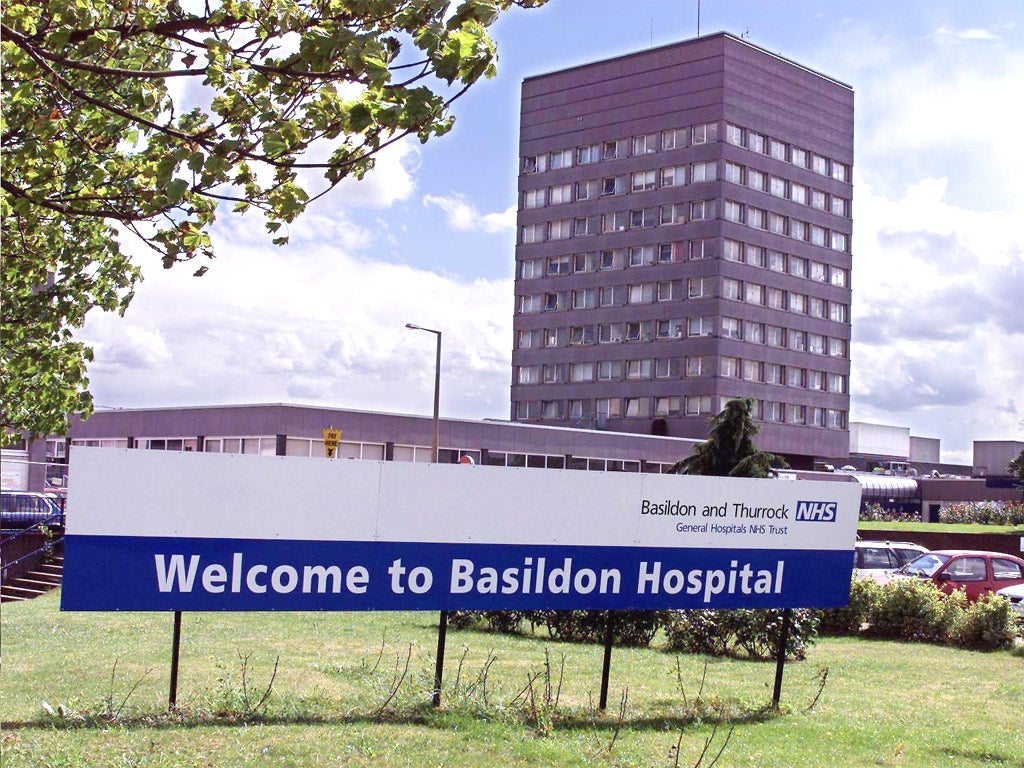Basildon University Hospital: NHS whistleblowers expose safety fears at maternity unit
Six babies needed cooling to avoid brain damage, inspectors report reveals

Your support helps us to tell the story
From reproductive rights to climate change to Big Tech, The Independent is on the ground when the story is developing. Whether it's investigating the financials of Elon Musk's pro-Trump PAC or producing our latest documentary, 'The A Word', which shines a light on the American women fighting for reproductive rights, we know how important it is to parse out the facts from the messaging.
At such a critical moment in US history, we need reporters on the ground. Your donation allows us to keep sending journalists to speak to both sides of the story.
The Independent is trusted by Americans across the entire political spectrum. And unlike many other quality news outlets, we choose not to lock Americans out of our reporting and analysis with paywalls. We believe quality journalism should be available to everyone, paid for by those who can afford it.
Your support makes all the difference.The Mid and South Essex Foundation Trust has been issued a formal warning after six serious incidents were identified at Basildon University Hospital's NHS maternity unit.
Whistleblowers who raised the alarm have been praised by the Care Quality Commission after inspectors found a cluster of incidents at the hospital following a tip-off and rating maternity services as inadequate overall following the unannounced inspection.
Chief inspector of Hospitals Ted Baker said: “We are grateful to the staff that contacted us to share their concerns – it takes courage to speak out and it’s vital that people feel able to do so to help identify areas for improvement and prevent poor care.”
In a report published on Wednesday the CQC said there had been six serious incidents in March and April this year where babies were born starved of oxygen at risk of brain injury. They needed cooling therapy which can help slow down the processes causing damage to the brain.
Inspectors said women who were classed as high-risk of suffering complications during labour but gave birth in parts of the unit meant for "low-risk" births.
The regulator also warned there were not enough staff with the skills and experience to keep women safe and highlighted what it called "dysfunctional" multidisciplinary team working that "impacted on the increased number of safety incidents reported".
Safety incidents were not graded correctly according to the level of harm, lessons learnt were not always implemented and care records were not securely stored, the regulator added.
In January this year a coroner criticised the hospital for “serious failings” in the care of Gabriela Pintilie who died after losing six litres of blood after giving birth to her daughter via an emergency caesarean section in February 2019.
A “breakdown in communication” meant doctors carrying out the c-section did not realise there was not enough blood and blood clotting products available.
Coroner Caroline Beasley-Murray issued a narrative verdict saying there was a “lack of leadership” to deal with the situation as well as a “lack of co-ordination and team work.”
A narrative verdict is used to describe the circumstances of a death and for the coroner to record their conclusions of what happened. It is used as alternative to other formal verdicts such as death as a result of neglect or by accident.
The NHS trust said its services were "safe to use" and apologised for not making improvements "quickly enough".
The department had previously been rated as "requiring improvement" following an inspection in February 2019.
The CQC's chief inspector of hospitals, Professor Ted Baker, said: "All staff we met during our inspection were welcoming, friendly and helpful.
"However, it was evident that they were concerned about the recent cluster of serious incidents and wanted to improve the care they provided to women and babies.
"We have issued a warning notice requiring the trust to make urgent improvements to ensure mothers and babies are safe."
Clare Panniker, chief executive of Mid and South Essex NHS Foundation Trust, said: "It is so important that mums feel safe when they come to us to have their babies, and that our staff feel supported to deliver the very best care.
"These are the two areas we've been focusing on and have taken urgent and significant action to address.
"We know that our services are safe to use, but I'm sorry that we didn't make improvements quickly enough.
"Our dedicated staff had already begun to make changes before the CQC visited us, and the report recognises that a raft of improvements had been put in place.
"We have a new leadership team, invested £1.8 million in recruiting 29 more midwives and two additional consultants, opened three more delivery beds for high-risk women, and created a triage service.
"We have also overhauled our processes and training to ensure that we offer women the very best care and support and that we are addressing the issues raised by the inspectors."
Join our commenting forum
Join thought-provoking conversations, follow other Independent readers and see their replies
Comments